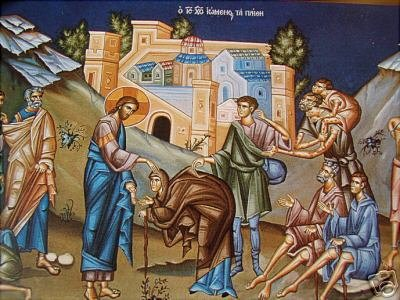|
|||
|---|---|---|---|
| This weekly bulletin insert complements the curriculum published by the Department of Christian Education of the Orthodox Church in America. This and many other Christian Education resources are available at http://dce.oca.org. | |||

Matthew 14:35-15:21 begins on a wonderful note as Jesus walks among His people. They send word around the whole region, and soon all who are sick come, press close, and touch the fringe (or tassel, worn by every pious Jew) of His garment. Then we read that "... as many as touched it were made well." But in the very next verse we are moved away from this beautiful picture of the Savior surrounded by and ministering to the sick. The scribes and Pharisees challenge Jesus with a question: "Why do your disciples transgress the tradition of the elders? For they do not wash their hands when they eat." Once again, Jesus' piety and His healing miracles are of no interest to His opponents. They are seeking a way to undermine Him, and they have both authority and a reputation as learned men, because they come from Jerusalem, the center of the Jewish faith. They are formidable enemies. But Jesus is quick with a challenge of His own. He refers to a rule of the Pharisees that says a man who has vowed to give his property to God can excuse himself, because of that vow, from the duty of supporting his parents. Jesus calls this an example of "tradition" being put ahead of what anyone knows is right and good: to care for those who raised you. It is a transgression of God's commandment to honor your father and mother. Next Jesus applies Isaiah's powerful words to the Pharisees, warning them to adhere to the word of God rather than human tradition. He calls the people to Him and tells them, "Hear and understand: not what goes into the mouth defiles a man, but what comes out of the mouth, this defiles a man." When the disciples warn Him that the Pharisees are offended by this apparent disrespect for ritual and tradition, He describes them as "blind guides" (meaning morally blind) and tells the disciples to let them alone. They are tied to their human traditions, and those traditions, not having been "planted" by His Father, "will be rooted up." Yet even the disciples need an explanation of what Jesus has said, so He provides it, while expressing His sadness, or perhaps surprise, that they are "also still without understanding." He says that what goes into the stomach simply passes through the body. The things that come out of the mouth are far more able to defile us, because they proceed from the heart. Verse 15: 19, in which Jesus names some of the terrible things that can come from the heart and the mouth, reminds us that we have spiritual work to do. We must pray and work to avoid and overcome the things He has named. Verse 20, in which He says that eating with unwashed hands won't defile anyone, shows why the tradition-bound Pharisees hated and feared Him, wishing Him only destruction. |
|||
